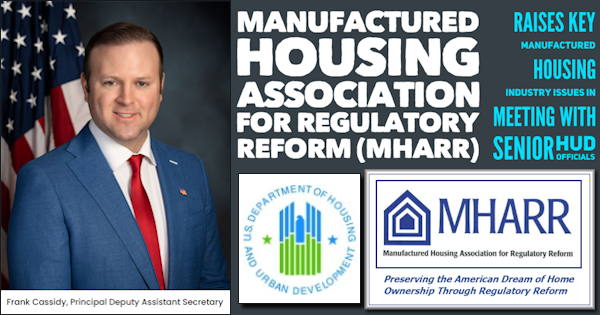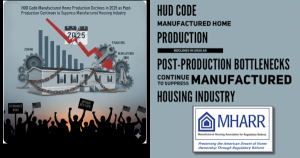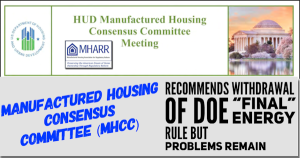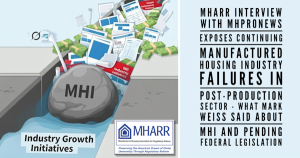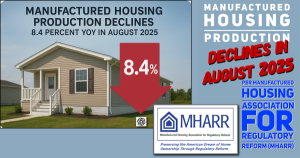(Washington, D.C.) Press release from Manufactured Housing Association for Regulatory Reform (MHARR).
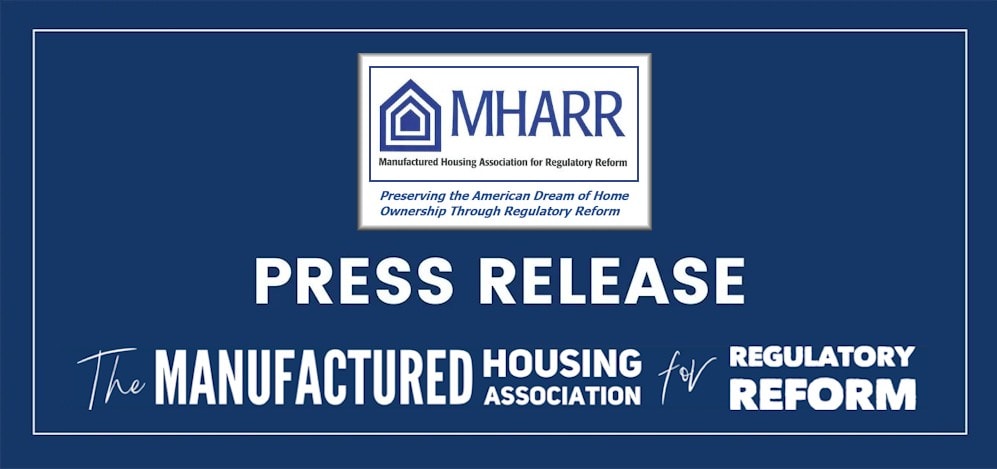
MHARR Raises Key MH Industry Issues in Meeting with Senior HUD Officials
JULY 28, 2025
TO: MHARR MANUFACTURERS
MHARR STATE AFFILIATES
MHARR TECHNICAL REVIEW GROUP (TRG)
FROM: MHARR
RE: MHARR RAISES KEY MH INDUSTRY ISSUES
IN MEETING WITH SENIOR HUD OFFICIALS
Manufactured Housing Association for Regulatory Reform (MHARR) President and CEO, Mark Weiss, and MHARR Senior Advisor Danny D. Ghorbani, met on July 24, 2025, with a delegation of senior HUD officials, led by Principal Deputy Assistant Secretary for Housing and Federal Housing Commissioner, Frank Cassidy.
MHARR sought this meeting as a follow-up to its March 2025 meeting with HUD Secretary Scott Turner and recent changes in the leadership of HUD’s Office of Manufactured Housing Programs (OMHP), in order to continue the process of addressing – and aggressively pursuing — the remediation, resolution and elimination of the principal policy bottlenecks that have resulted in stagnant industry production levels for the past decade and have needlessly suppressed the production and utilization of inherently affordable mainstream manufactured housing. These main bottlenecks, as previously and extensively analyzed by MHARR, include (1) discriminatory and exclusionary zoning mandates; (2) lack of federal support for manufactured home consumer financing by Fannie Mae and Freddie Mac pursuant to the Duty to Serve (DTS) directive; and (3) impending draconian federal manufactured housing “energy conservation” standards.
Specifically, with respect to these issues, MHARR urged Commissioner Cassidy and the HUD team to utilize statutory authority that the agency already has under the enhanced federal preemption of the Manufactured Housing Improvement Act of 2000 (2000 Reform Law), to more aggressively target and remediate instances of discriminatory zoning that excludes affordable mainstream manufactured homes from far too many areas of the country and simultaneously (and baselessly) undermines the availability of affordable homeownership (via manufactured housing) for millions of Americans.
MHARR pointed out that current HUD preemption guidance from 1997 predates the substantive preemption enhancements of the 2000 Reform Law and must be updated to accurately reflect the current state of the law. That update, in turn, must reflect a rejection of the targeted zoning exclusion of HUD Code manufactured homes, rooted largely in local opposition to the regulation of manufactured housing under a federal code and federal standards, rather than state or local building codes and standards. Once adopted, such an updated HUD preemption statement could then be utilized by HUD itself – and private parties as well (including industry groups and even consumers) – to challenge and seek the invalidation of such illegitimate, discriminatory and exclusionary zoning laws.
In addition to the prevention/elimination of zoning exclusion, MHARR also addressed the need for competitive-rate consumer financing for mainstream manufactured housing purchases (particularly in light of the nearly 20-year failure of Fannie Mae and Freddie Mac to implement the DTS mandate with respect to the dominant chattel consumer financing market), and urged the Commissioner to continue reviewing and adjusting, as appropriate, Federal Housing Administration (FHA) programs for manufactured home financing, particularly the Title I program. The HUD delegation acknowledged the steep drop-off in FHA manufactured housing loans that has occurred since the 1990s and indicated that they are attuned to the need to revitalize that source of much-needed consumer financing support.
MHARR also raised the need for balance and fairness in relation to the statutory Manufactured Housing Consensus Committee (MHCC), noting that the immediate-past Office of Manufactured Housing Programs leadership (now serving as a Manufactured Housing Institute Vice President) had drastically skewed MHCC membership toward the industry’s largest corporate conglomerates – with multiple representatives of the same companies serving at the same time and certain HUD-favored members having been appointed to term after term after term. MHARR stressed to the Commissioner that smaller, independent manufacturers (which are disproportionately impacted by needless and/or excessive regulation) need to be fully and properly represented on the MHCC, and that such representation must include collective representation through an MHARR staff member.
Finally, MHARR advised the HUD delegation of its recent meeting with high-level U.S. Department of Energy (DOE) officials regarding impending manufactured housing “energy conservation” standards and the absolute necessity of withdrawing and repudiating those standards both at DOE AND as may be pending or under consideration at HUD. MHARR advised the Commissioner that energy costs for manufactured homes, per U.S. Census Bureau data, are already lower than those for other types of homes and that the type of draconian standards now pending are both unnecessary and would further destroy the supply and availability of truly affordable housing for moderate and lower-income Americans.
Following this detailed and productive meeting, MHARR will continue to engage with leaders in the Trump Administration to seek a reduction of the regulatory barriers confronting the HUD Code industry and to promote the availability and utilization of inherently affordable mainstream manufactured housing as a means to bring to fruition the affordable homeownership agenda being pursued by both President Trump and Secretary Turner.
cc: Other Interested HUD Code Manufactured Housing Industry Members
Manufactured Housing Association for Regulatory Reform (MHARR)
1331 Pennsylvania Ave N.W., Suite 512
Washington D.C. 20004
Phone: 202/783-4087
Fax: 202/783-4075
Email: MHARRDG@AOL.COM
Website: www.manufacturedhousingassociation.org
MHARR is a Washington, D.C.-based national trade organization representing the views and interests of independent producers of federally-regulated manufactured housing.
The “MHARR Washington Update” is available for re-publication in full or in part (without alteration or substantive modification) without further permission and with link back and proper attribution to MHARR.

